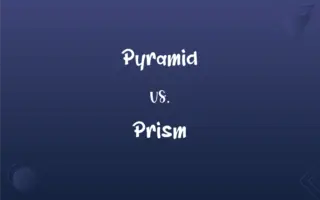Soy Lecithin vs. Sunflower Lecithin: What's the Difference?
Edited by Aimie Carlson || By Harlon Moss || Published on December 17, 2023
Soy lecithin is a fatty substance extracted from soybeans, used as an emulsifier, while sunflower lecithin comes from sunflower seeds and is often used as a soy-free alternative.

Key Differences
Soy lecithin, derived from soybeans, is commonly used in food and supplements for its emulsifying properties. Sunflower lecithin, sourced from sunflower seeds, serves a similar purpose but is preferred by those avoiding soy due to allergies or other reasons.
The extraction process of soy lecithin often involves chemicals, which can be a concern for some consumers. Sunflower lecithin is typically extracted through a cold-pressing process, making it appealing to those seeking a more natural product.
Soy lecithin is known for its versatility and is widely used in a variety of products from chocolates to health supplements. Sunflower lecithin is less common but is gaining popularity as a soy-free and non-GMO option.
Allergy concerns are more common with soy lecithin due to soy being a common allergen. Sunflower lecithin is generally considered hypoallergenic, making it a safer choice for those with soy allergies.
In terms of nutritional profile, both soy and sunflower lecithin provide beneficial phospholipids, but sunflower lecithin is often preferred for its perceived cleaner label and non-GMO status.
ADVERTISEMENT
Comparison Chart
Source
Extracted from soybeans
Extracted from sunflower seeds
Extraction Process
Often involves chemicals
Typically extracted through cold pressing
Allergen Concerns
Common allergen (soy)
Generally hypoallergenic
Popularity
Widely used in various products
Less common, but growing in popularity
Perception
Versatile, but concerns over GMOs
Preferred for non-GMO, natural extraction
ADVERTISEMENT
Soy Lecithin and Sunflower Lecithin Definitions
Soy Lecithin
Soy lecithin is a compound containing phospholipids, derived from soybeans, used in food processing.
Soy lecithin is an important ingredient in vegan baking for its binding properties.
Sunflower Lecithin
Sunflower lecithin is utilized in the cosmetic industry for its skin-friendly properties and natural origin.
Her favorite moisturizer uses sunflower lecithin to maintain a smooth texture.
Soy Lecithin
Soy lecithin is used as a supplement for its potential health benefits, including cholesterol management.
He takes a daily supplement of soy lecithin for heart health.
Sunflower Lecithin
Sunflower lecithin is a soy-free alternative used in various dietary products, valued for its non-allergenic properties.
The protein powder markets its use of sunflower lecithin as a hypoallergenic feature.
Soy Lecithin
Soy lecithin acts as a natural emulsifier and preservative in various food products.
Many salad dressings contain soy lecithin to keep oil and vinegar mixed.
Sunflower Lecithin
Sunflower lecithin is preferred for its non-GMO status and is used as a stabilizer and emulsifier in health supplements.
The new line of organic supplements highlights sunflower lecithin as a key ingredient.
Soy Lecithin
Soy lecithin is a byproduct of soybean oil production, used in the food and pharmaceutical industry.
The nutrition bar contains soy lecithin to blend its ingredients effectively.
Sunflower Lecithin
Sunflower lecithin, rich in phospholipids, is extracted through a mechanical process, making it popular in natural foods.
Organic chocolate brands often use sunflower lecithin as a clean-label emulsifier.
Soy Lecithin
Soy lecithin is a fatty substance extracted from soybeans, used as an emulsifier and stabilizer in food.
Soy lecithin is often added to chocolate to maintain its smooth texture.
Sunflower Lecithin
Sunflower lecithin is a natural emulsifier obtained from sunflower seeds, often used in food and health products.
Sunflower lecithin is added to the bread dough to improve its consistency.
FAQs
What makes sunflower lecithin a "cleaner" option?
Its extraction method is more natural, often involving cold pressing.
Can soy lecithin affect hormone levels?
Some concerns exist about soy products affecting hormones, but evidence is limited.
How is soy lecithin extracted?
Typically, it's extracted using chemical solvents from soybean oil.
What is soy lecithin commonly used for?
It's used as an emulsifier in foods and supplements.
Are there health benefits to taking soy lecithin supplements?
Soy lecithin supplements are believed to aid in cholesterol management and cognitive health.
Does sunflower lecithin have a different taste compared to soy lecithin?
Sunflower lecithin is generally milder in taste than soy lecithin.
Is sunflower lecithin more expensive than soy lecithin?
Typically, sunflower lecithin is slightly more expensive due to its extraction process.
Can sunflower lecithin be used in baking?
Yes, it's a great emulsifier and stabilizer in baking recipes.
Is sunflower lecithin a good alternative for those with allergies?
Yes, it's a popular choice for people with soy allergies.
Is soy lecithin vegan?
Yes, soy lecithin is vegan as it's derived from plants.
Can soy lecithin cause allergic reactions?
Yes, for those allergic to soy, it can trigger allergic reactions.
What are the environmental impacts of soy lecithin production?
Soy cultivation can have significant environmental impacts, including deforestation.
How does soy lecithin affect food texture?
It helps maintain smoothness and prevents separation in food products.
Is soy lecithin found in chocolate?
Yes, it's commonly used in chocolate to improve texture and shelf life.
Can soy lecithin improve heart health?
Some studies suggest it may have benefits for heart health, though more research is needed.
What types of products commonly use sunflower lecithin?
It's used in natural food products, supplements, and cosmetics.
Is there a difference in shelf life between soy and sunflower lecithin products?
The shelf life is generally similar, but storage conditions can affect longevity.
Is sunflower lecithin non-GMO?
Sunflower lecithin is usually non-GMO, making it a preferred choice for many.
What are the main differences in the nutrient profile between the two?
Both contain beneficial phospholipids, but their fatty acid compositions may differ slightly.
Does sunflower lecithin contain any allergens?
Sunflower lecithin is generally considered hypoallergenic.
About Author
Written by
Harlon MossHarlon is a seasoned quality moderator and accomplished content writer for Difference Wiki. An alumnus of the prestigious University of California, he earned his degree in Computer Science. Leveraging his academic background, Harlon brings a meticulous and informed perspective to his work, ensuring content accuracy and excellence.
Edited by
Aimie CarlsonAimie Carlson, holding a master's degree in English literature, is a fervent English language enthusiast. She lends her writing talents to Difference Wiki, a prominent website that specializes in comparisons, offering readers insightful analyses that both captivate and inform.






































































